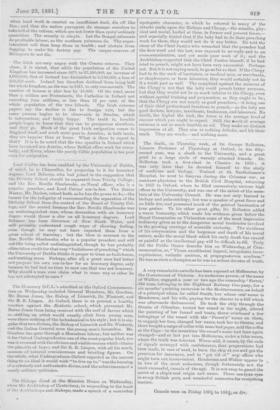The death, on Thursday week, of Dr. George Rolleston, Linacre
Professor of Physiology at Oxford, in his fifty- second year, was a shock to the University, and a great grief to a largo circle of warmly attached friends. Dr. Rolleston took a first-class in Classics in 1850; it was only later that he devoted himself to the study of medicine and biology. Trained at St. Bartholomew's Hospital, he went to Smyrna during the Crimean war, as assistant-physician to the British Civil Hospital, returning in 1857 to Oxford, where he filled successively various high offices in the University, and was one of the ablest of the mem- bers of the University Council. He was not only learned in biology and palitiontology, but was a speaker of great force and no little fire,•and possessed much of the gen6ral fascination of true genius. To his other great gifts, Dr. Rolleston added a warm humanity, which made his evidence given before the Royal Commission on Vivisection some of the most impressive testimony given as to the dangerous moral tendencies involved in the growing cravings of scientific curiosity. The vividness of his canyersation and the largeness and depth of his moral nature, make the moral blank which his early death has caused. as painful as the intellectual gap will be difficult to fill. Truly did the Public Orator describe him on Wednesday, at Com- memoration, as," Virum excultissimi ingenii, integritatis incor- rnptissirmie, veritatis amicum, at propugnatorem acerbum." He was as stern a champion as he was an ardent devotee of truth.



















 Previous page
Previous page